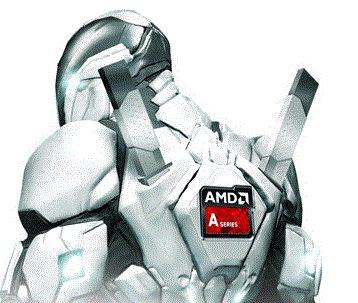Any time that a stock is heavily shorted, investors can easily get spooked. It takes more guts and fiscal fortitude to bet against a company than most investors have. So, if many short sellers are betting against a company then it means something is bad — right? Not necessarily. Our take now is that short sellers in Advanced Micro Devices Inc. (NYSE: AMD) are either mistaken or they are using the company’s broken PC business model against Intel Corp. (NASDAQ: INTC) of yesteryear as their best argument.
24/7 Wall St. just identified the stocks with the highest number of shares held short, and AMD appeared on this list. This might just be enough to scare away traditional turnaround or value investors. There is a real possibility that this time truly is different and those short sellers are looking at a 2007 to 2012 AMD rather than the AMD of 2013 to 2016. The short interest in Intel at the end of June was actually down almost 5%.
These short sellers could — quite ironically — end up being the best allies of those investors who are buying into the AMD turnaround. Remember, when short sellers exit a stock they have to buy the stock. This could create a serious short squeeze if and when they decide to exit.
AMD’s short interest rose by about 2.5% to more than 111.69 million shares by the end of June. This was represented as about 18% of the stock’s float. It also followed a 5% increase in the number of shares short in the mid-June report. Interestingly enough, the days to cover fell to about four.
So, why does this not matter? Short sellers are supposed to be very smart and very well informed. Analysts have not been on board with AMD either. That adds credibility to the short sellers as well, right? Neither scenario seems correct this time around. The wild card in the days ahead is that we will know what AMD’s earnings report looks like this coming Thursday (July 17).
ALSO READ: RBC’s Five Top Chip Stocks to Buy With at Least 20% Implied Upside
As far as what analysts are looking for in AMD’s earnings, the Thomson Reuters consensus estimates are $0.02 in earnings per share (versus -$0.09 a year ago) and $1.44 billion in revenue (up 24% from a year ago). The coming quarter is shown to have a consensus of $0.07 per-share earnings (versus $0.04 a year ago) and a 7% revenue gain to $1.56 billion.
What 24/7 Wall St. wants to pass on to its readers is that this is the first time in maybe a decade that AMD’s turnaround seems solid. We had been extremely critical of the company in years past, but when things turn they really turn. AMD even made our own list of nine stocks that could double in 2014, back when AMD was around $3.50, implying that the stock could go up to as much as $7! AMD’s 52-week range is $3.04 to $4.65, and we have not backed off from our upside targets regardless of a significant outperformance against the market.
AMD shares were up 1.8% in mid-day trading on Friday at $4.37. Despite a very volatile and cautious week for the markets, AMD was up about 3% from this time a week ago.
Don’t think this is a universal bash against short sellers, nor is it a bash against anyone who doesn’t believe this time is different. Our take is that this time is very different. Either we will be proven wrong or the short sellers will be proven wrong.
To show why this time is different would take too long to discuss in a short piece on a Friday. Here are some of those key points we would consider as the “why” this time around versus previous periods:
- AMD is no longer a graphics and stagnant PC processor-only model; now it has the design wins for the Xbox One and PS4 gaming console upgrade cycle.
- The PC business has been in the toilet for years’ and now the PC market offers marginal upside rather than downside.
- AMD management team was always hamstrung and not fully in touch in the past; now the team is solid and it is even confident enough to realign its units.
- AMD has been pulling a move from Sirius XM — keep refinancing debt at better terms and extending out those maturities.
- AMD was largely considered behind the curve in technology advances for years; it now may be able to make more headway into servers and its customization efforts for large tech companies is likely buying it more and more goodwill among end-users at the new tech giants.
- AMD, like Intel, missed the boat on smartphones and tablets; very key hires out of Apple and Qualcomm now have AMD in the running for this space in the years ahead — albeit still only as a wild card.
- A recent analyst downgrade felt like an analysis of yesteryear; now we had two very positive analyst calls for upside in June from two firms.
Admittedly, a lot has been skipped over here. Much has even been left out — like NVIDIA. The coming earnings report could create short-term volatility, and maybe not even in a good way. Unless there are key departures and unless there is some indication that the turnaround’s long-term vision is not going to play out, we are looking way beyond this coming earnings report. Our view is later in 2014, 2015 and even into 2016.
ALSO READ: Merrill Lynch’s Top Value Stock Picks for the Rest of 2014
We would point out that the short interest at the time of our call for it to potentially be a double was at the highest point of 2014 — up at 127.4 million shares. That short interest may have risen during June, but it is down handily since our call was made, and the stock is up 25% since the call to potentially double.
One last thought is if AMD’s turnaround just does not take hold. What if AMD keeps biting into Intel ahead above and beyond graphics and gaming processors? It only takes a couple points or a few points of market share for it to show up only modestly negative for Intel and exponentially better for AMD.
Now, consider this in closing. Intel now trades at almost three times trailing revenues, but AMD trades at 0.6 times trailing revenue. And finally, consider that Intel has to keep AMD around whether it wants to or not. Even if you just want to consider the model of yesteryear as the benchmark, Intel could have a monopoly and antitrust issues on its hands all over again if it crushes AMD.
Maybe the short sellers are making a short-term play only here. If they are betting against AMD longer term, they may very well be on the wrong side of the bet. Again, we will revisit this situation a day or two after the next earnings report. Unless the long-term turnaround is in jeopardy, we would even view any post-earnings weakness as yet another opportunity to get in.
Stay tuned!
ALSO READ: Top Gold Stocks to Buy for the Rest of 2014
Thank you for reading! Have some feedback for us?
Contact the 24/7 Wall St. editorial team.





